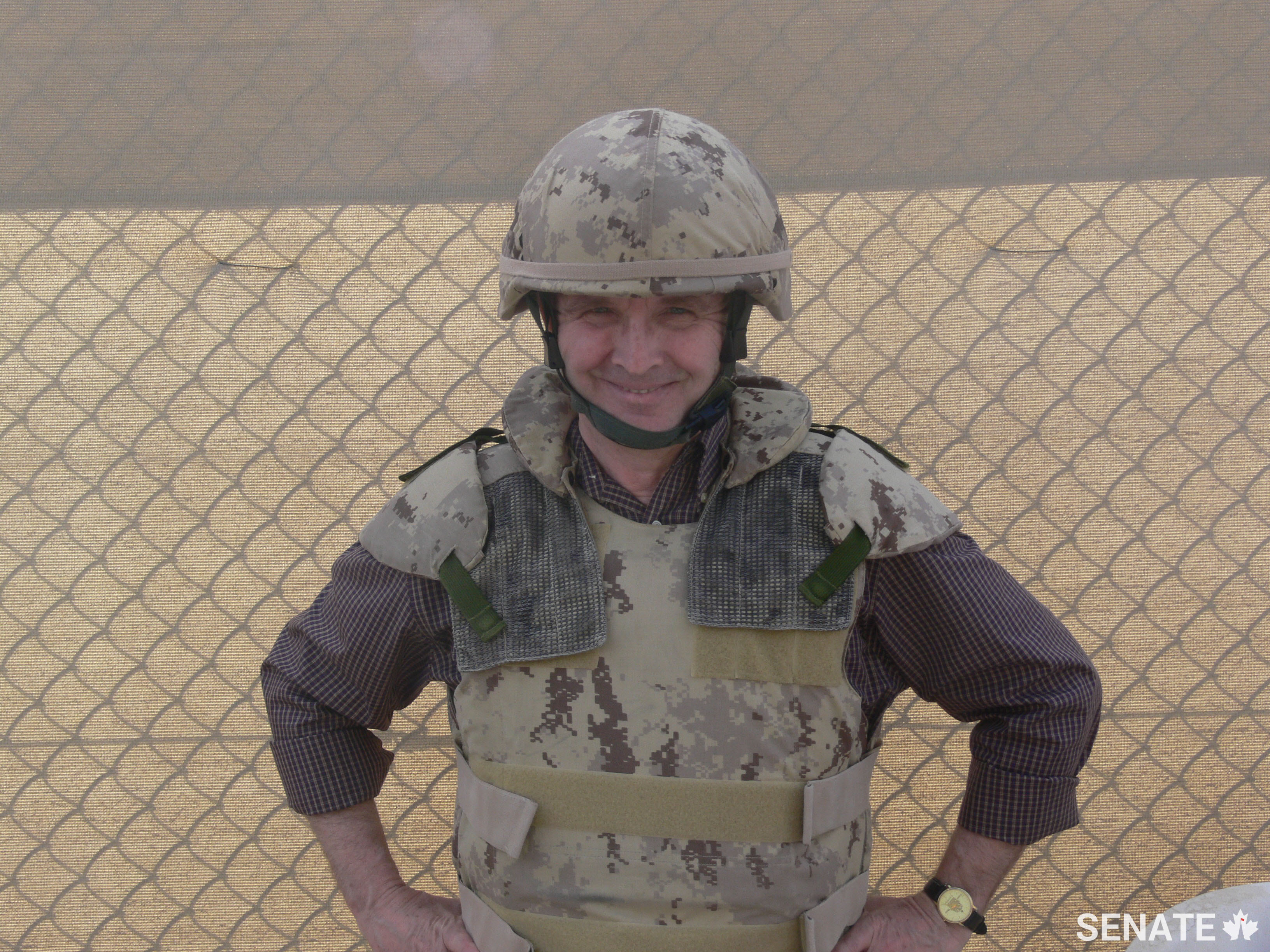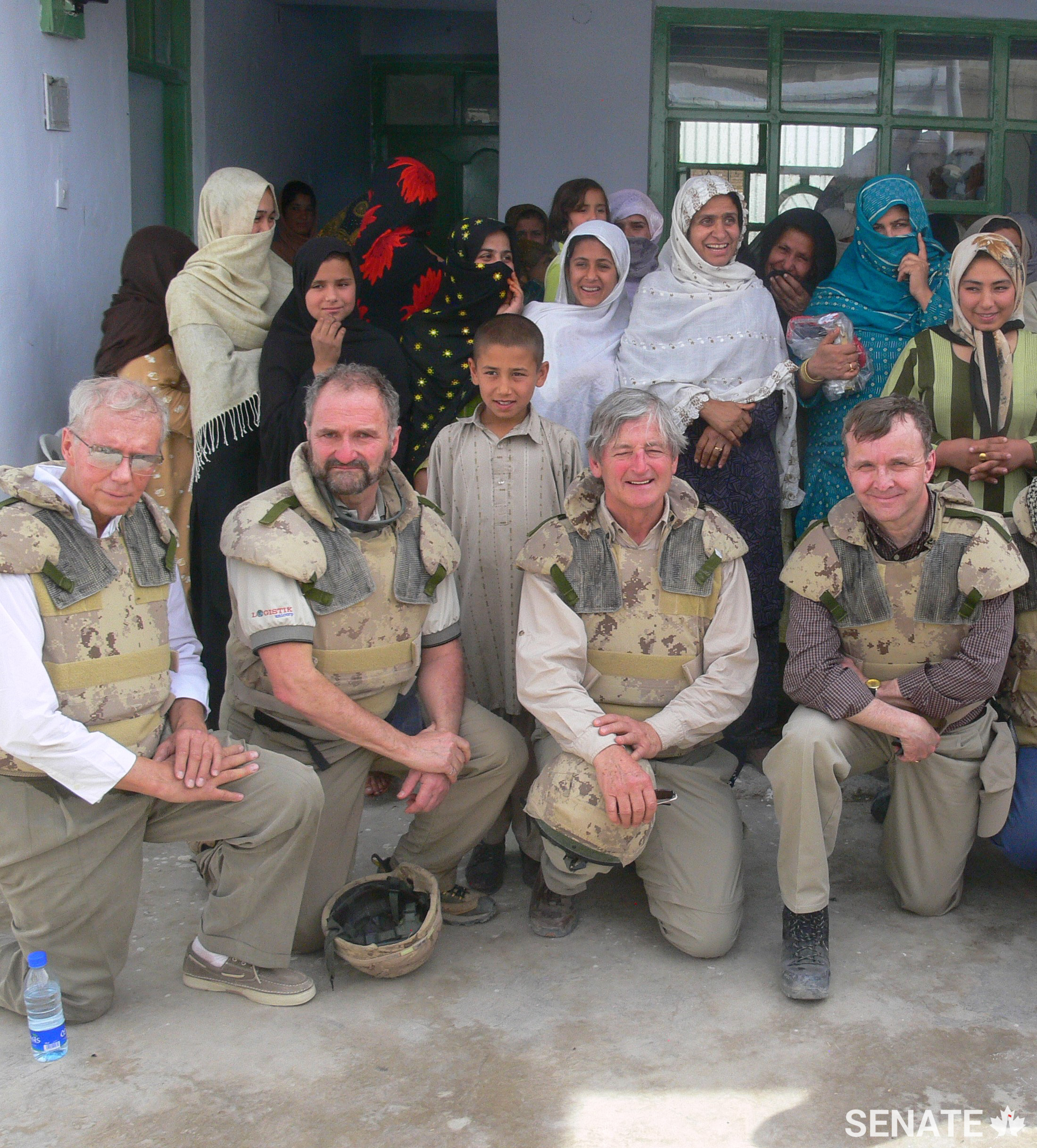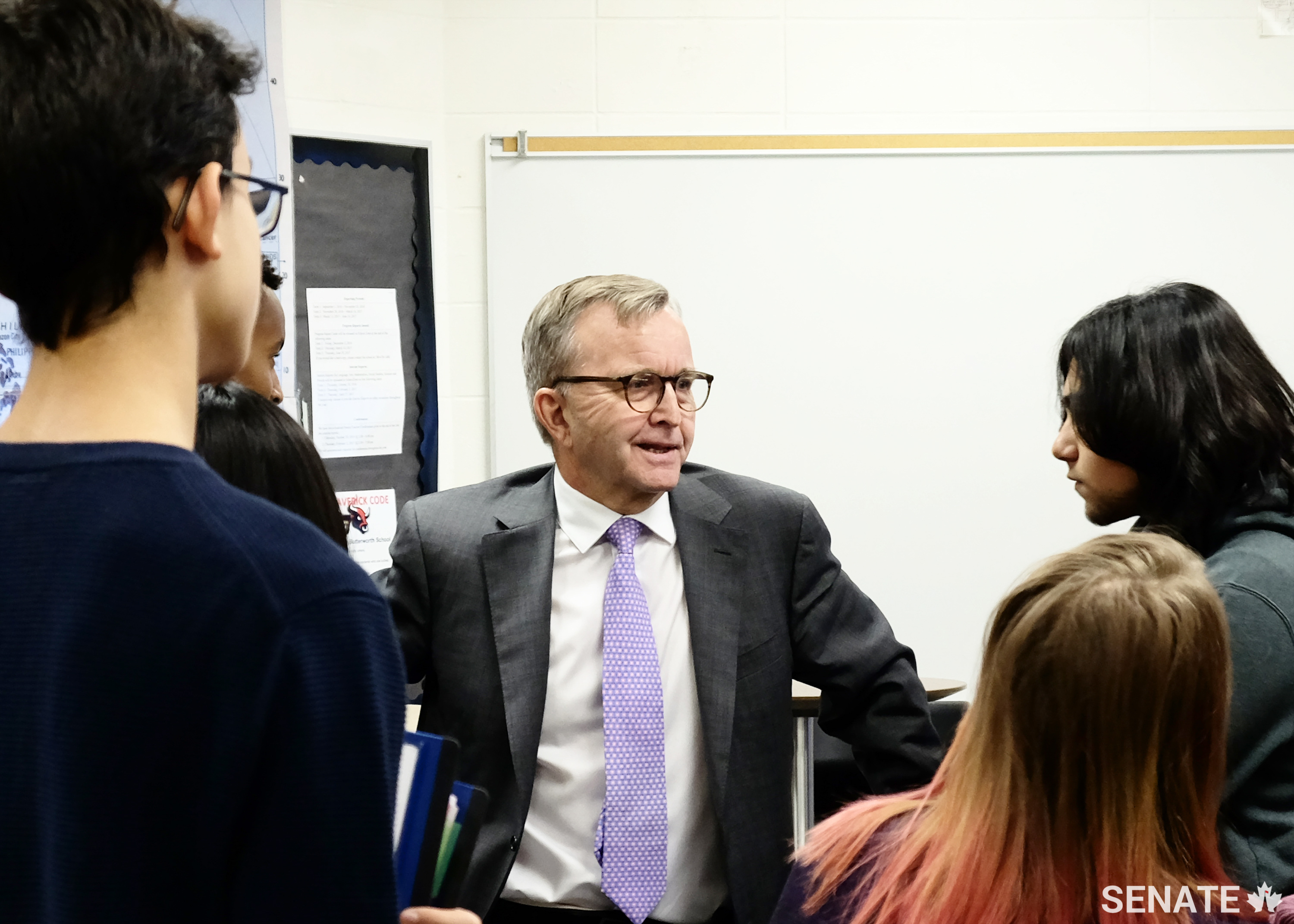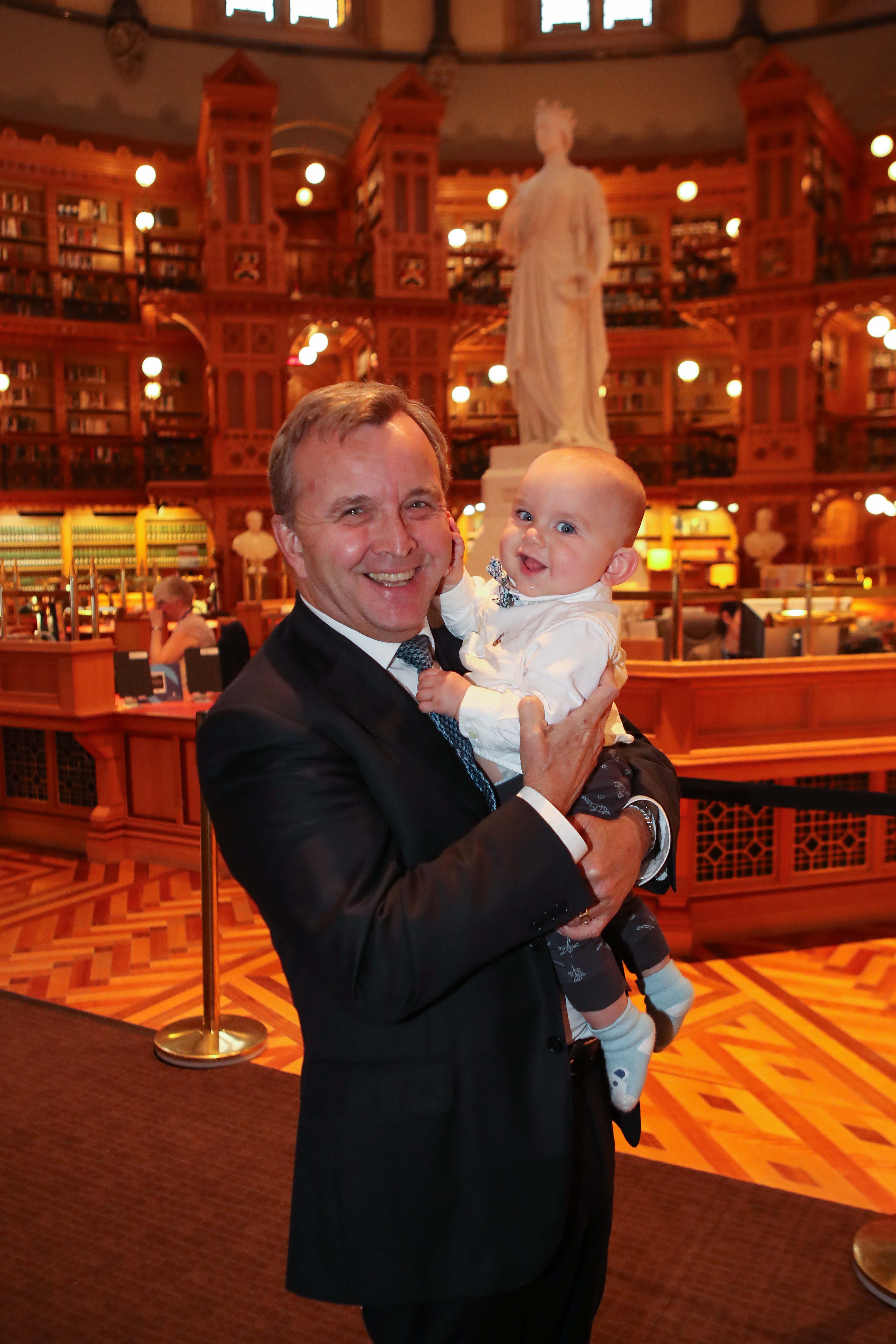‘Way to be’: Senator Mitchell reflects on his Senate career championing equality

Shaped by his father’s experience as a Canadian soldier in the Second World War, Senator Grant Mitchell made fighting for equality a central focus of his time in the Senate. Whether it was same-sex marriage, women’s rights, gender identity protections or climate change, Senator Mitchell championed fairness for all.
After serving his home province of Alberta in public life for nearly 30 years — including 15 years in the Red Chamber — Senator Mitchell retired in April 2020. In an interview with SenCAplus, he reflects on his time in the Upper Chamber and the Senate’s role in Canadian democracy.
Fifteen years ago, Prime Minister Paul Martin named you as a senator. You had already served as a Liberal member of the legislative assembly (MLA) in Alberta for 12 years, including four as party leader. How did that prepare you for the Senate?
It was an advantage to have experience in a legislative chamber, an understanding of the architecture of the legislative process and the roles of committees. The transition to speaking in the Senate Chamber was also relatively easy having spoken an infinite number of times in the Alberta legislature.
I also had a strong sense of the nation, which is important to bring to the Senate. Since my father was in the military, I’d lived in seven different provinces. As an MLA, I’d driven, visited, and knocked on doors in literally every corner of Alberta. It gave me a strong, positive relationship with the interests of Albertans.
Your first major vote as a senator was same-sex marriage. Your focus on equality continued from there to include transgender protections, women’s rights, combatting harassment and considering climate change as a rights issue. Why has this work been so important to you?
I don’t claim to be a constitutional rights expert, but I am deeply motivated to do what I can to ensure people are treated equally and not abused or diminished.
My father fought in the Second World War against great evil. Defending what is right and people who are being treated unfairly was a powerful influence in our lives. My father hated bullies and I’ve always hated bullies. Nobody has the right to harm, dismiss or diminish other people. We need to treat people equally.
Canada is remarkable in its diversity and the way it’s created a society of acceptance and understanding. Having said that, we are not perfect. Prejudice is an insidious thing. Women aren’t fundamentally equal in our society yet. And just two years ago, at the national level, we established transgender rights for a group of people who have lived in pressures and agonies that most of us can never even imagine. We can be proud of our record, but we still have a long way to go.
Your committee work was prolific. What stands out for you as most memorable?
The most memorable committee work was my trip with the Senate Committee on National Security and Defence to Afghanistan during the war, no question about it. It was a remarkable experience from the moment we arrived at Kandahar airbase. I will never forget meeting the Canadian women and men who were there leading the world. When we visited, a Canadian general was running the Western military in Afghanistan and another Canadian general was running the operations in Kandahar. We had the opportunity to see military personnel in action, experience the way Afghan people lived and observe the way women were treated.
It was powerful. Visits like it informed committee recommendations that included the need for tanks and helicopters. Canadian Forces members weren’t flying over improvised explosive devices like other militaries, so Canada decided to get helicopters and heavier tanks to adapt to the nature of the fighting.
Another important part of my committee work was on sexual harassment in the Royal Canadian Mounted Police (RCMP). I initiated that study, with consensus from all sides of the Senate, and it became a long-term project that made progress in changing the culture of the RCMP.
I was also a long-standing member of the Senate Committee on Energy, the Environment and Natural Resources. The committee was often caught in the vortex of the debate about the economy and the environment, but we did a lot of work to elevate the issue of climate change.
During the last session of Parliament, you became the first government liaison in the Senate as part of the Government Representative Office (GRO). What did you learn from this experience and how do you think it will shape the Senate in the future?
Nobody in the history of the world has had that job before. It was interesting because you had a responsibility to pass government legislation, but you had no caucus that you could depend upon.






You did have the force of the understanding that it would be dangerous for the Senate to defeat government legislation without a very good reason, which has rarely happened since 1945. But there was no guarantee it would pass, despite tremendous pressure and responsibility to get legislation through. It was hugely challenging —in a good way — and historic, because it had never been done before.
I was always impressed by the powerful interest that senators and parliamentarians have in doing what’s right and their deep concern for Canadians. I learned people would listen to good argument. I also learned a lot from my GRO colleagues, senators Peter Harder and Diane Bellemare, who enriched what was one of the most significant highlights of my career. I’m grateful I had the chance to be government liaison and that the prime minister had the confidence to allow me to do that.
I’ve also learned you can’t do any job in the Senate without outstanding staff. I’ve been fortunate to have been supported by amazing people including Sarah Gray, who was my chief of staff for 12 years.
In terms of how the GRO has shaped the Senate, I don’t believe the people who have been appointed recently are better than those who used to be appointed. I do believe people appointed under the new system are removed from any suggestion of partisanship in their appointments and that assists in the overall credibility of the Senate. The Senate has also done good work under both processes, but the work done now is distinguished by the greater sense of independence.
It’s getting closer to a refined model of complementarity and that’s extremely important. We don’t need another partisan-driven, caucus-based Chamber. We’ve got one in the House of Commons, and that’s good. But we need another element; a more technical and dispassionate look. Not better, but different.
Along with the legislative agenda of the Senate, you’ve also supported changes to how the administration supports senators. Why was that important to you?
My support for the administration has been focused on communications. The Senate now has a modern communications process and directorate that other legislatures in Canada and the world are watching. Our institutions are fighting for credibility. It’s extremely difficult to lead in difficult times if you don’t have respected institutions. Social media and cynicism are continuously eroding credibility. To fight back, we need to communicate the work being done so Canadians are reassured and trust their institutions. It’s critical in building the strong, positive, effective political leadership that makes a country like Canada great.
More generally, I have huge respect for the administration staff, from the pages to the clerks to the guards to the guides. The people who work at the Senate believe deeply in that institution. They love it. We love it. They support the Senate’s work in a way that is quite remarkable and can’t be taken for granted.
You’re known for the catchphrase “way to be.” What does it mean and what effect do you hope it has on people?
I got it from a young person who worked for me 30 years ago. It’s important to be positive to the people you work with and lead. It’s easy to think that smart, important people in your organization don’t need it, because they are capable and confident. But everyone needs to be encouraged and recognized. “Way to be” became my way of saying thanks and good work. And I just like saying it!
Speaking of encouraging others, what advice do you have for new senators?
When I speak to new colleagues, I start by underlining how remarkable the Senate and the parliamentary system is. It is the most successful system on the face of the earth. It has lasted for at least 900 years because it reflects the human condition and has the flexibility to meet human needs.
Then I say keep everything in perspective. It’s easy to think I’m important, but I’m not. I’ve been lucky to have important jobs and I hope I’ve risen to do them well.
My last piece of advice is that focus matters. In my experience, great senators focus on one or two issues. For example, former senator Sharon Carstairs is one of the greatest senators I’ve ever known, and she became an international expert on palliative care. I picked up on women’s rights issues and climate change, which informed the committees I worked on and the studies I promoted. From women’s equality, it wasn’t a far leap to equality in general and marriage equality. Then came sponsoring Bill C-16 on transgender rights, which was undoubtedly the most significant and fulfilling thing I worked on.
As a senator from Alberta, what should Canadians understand about your province and how has it shaped your work as a senator?
The people of Alberta are kind: they respect and care for their neighbours. There is a sense of alienation that ebbs and flows in the national discourse, but the people of Alberta care deeply about Canada and issues other Canadians care about, like the environment. They are highly industrious, work hard and measure their contribution to Canada in terms of their economic success. They are just really good people who want to make their province and this country a better place.
What are your priorities in the next chapter of your life?
My wife Teresa and I have three sons, who all live in Vancouver. Our grandson also lives in Vancouver. You’d know him if you bumped into him on the street because he is the most beautiful baby you’ve ever seen. We love Edmonton and had a wonderful life there, but Edmonton-Ottawa-Ottawa-Edmonton became increasingly a long way away from our children. I’ve been away a lot in my life, and that’s haunted me. So we’ve moved to British Columbia and are living a five-hour drive from Vancouver in the Okanagan Valley. It’s where my mother is from and where my parents met, so I have roots here.
I also want to get fit again. I’ve done Ironman Triathlons in Penticton, B.C. and Hawaii. I’ve run, swum and cycled thousands of kilometres. I want to feel well and be fit. In fact, I’m going out for a ride right after this!
The Honourable Grant Mitchell retired from the Senate of Canada in April 2020. Visit the Library of Parliament's Parlinfo website to learn more about his work in Parliament.
Related articles
Tags
Committee news
‘Way to be’: Senator Mitchell reflects on his Senate career championing equality

Shaped by his father’s experience as a Canadian soldier in the Second World War, Senator Grant Mitchell made fighting for equality a central focus of his time in the Senate. Whether it was same-sex marriage, women’s rights, gender identity protections or climate change, Senator Mitchell championed fairness for all.
After serving his home province of Alberta in public life for nearly 30 years — including 15 years in the Red Chamber — Senator Mitchell retired in April 2020. In an interview with SenCAplus, he reflects on his time in the Upper Chamber and the Senate’s role in Canadian democracy.
Fifteen years ago, Prime Minister Paul Martin named you as a senator. You had already served as a Liberal member of the legislative assembly (MLA) in Alberta for 12 years, including four as party leader. How did that prepare you for the Senate?
It was an advantage to have experience in a legislative chamber, an understanding of the architecture of the legislative process and the roles of committees. The transition to speaking in the Senate Chamber was also relatively easy having spoken an infinite number of times in the Alberta legislature.
I also had a strong sense of the nation, which is important to bring to the Senate. Since my father was in the military, I’d lived in seven different provinces. As an MLA, I’d driven, visited, and knocked on doors in literally every corner of Alberta. It gave me a strong, positive relationship with the interests of Albertans.
Your first major vote as a senator was same-sex marriage. Your focus on equality continued from there to include transgender protections, women’s rights, combatting harassment and considering climate change as a rights issue. Why has this work been so important to you?
I don’t claim to be a constitutional rights expert, but I am deeply motivated to do what I can to ensure people are treated equally and not abused or diminished.
My father fought in the Second World War against great evil. Defending what is right and people who are being treated unfairly was a powerful influence in our lives. My father hated bullies and I’ve always hated bullies. Nobody has the right to harm, dismiss or diminish other people. We need to treat people equally.
Canada is remarkable in its diversity and the way it’s created a society of acceptance and understanding. Having said that, we are not perfect. Prejudice is an insidious thing. Women aren’t fundamentally equal in our society yet. And just two years ago, at the national level, we established transgender rights for a group of people who have lived in pressures and agonies that most of us can never even imagine. We can be proud of our record, but we still have a long way to go.
Your committee work was prolific. What stands out for you as most memorable?
The most memorable committee work was my trip with the Senate Committee on National Security and Defence to Afghanistan during the war, no question about it. It was a remarkable experience from the moment we arrived at Kandahar airbase. I will never forget meeting the Canadian women and men who were there leading the world. When we visited, a Canadian general was running the Western military in Afghanistan and another Canadian general was running the operations in Kandahar. We had the opportunity to see military personnel in action, experience the way Afghan people lived and observe the way women were treated.
It was powerful. Visits like it informed committee recommendations that included the need for tanks and helicopters. Canadian Forces members weren’t flying over improvised explosive devices like other militaries, so Canada decided to get helicopters and heavier tanks to adapt to the nature of the fighting.
Another important part of my committee work was on sexual harassment in the Royal Canadian Mounted Police (RCMP). I initiated that study, with consensus from all sides of the Senate, and it became a long-term project that made progress in changing the culture of the RCMP.
I was also a long-standing member of the Senate Committee on Energy, the Environment and Natural Resources. The committee was often caught in the vortex of the debate about the economy and the environment, but we did a lot of work to elevate the issue of climate change.
During the last session of Parliament, you became the first government liaison in the Senate as part of the Government Representative Office (GRO). What did you learn from this experience and how do you think it will shape the Senate in the future?
Nobody in the history of the world has had that job before. It was interesting because you had a responsibility to pass government legislation, but you had no caucus that you could depend upon.






You did have the force of the understanding that it would be dangerous for the Senate to defeat government legislation without a very good reason, which has rarely happened since 1945. But there was no guarantee it would pass, despite tremendous pressure and responsibility to get legislation through. It was hugely challenging —in a good way — and historic, because it had never been done before.
I was always impressed by the powerful interest that senators and parliamentarians have in doing what’s right and their deep concern for Canadians. I learned people would listen to good argument. I also learned a lot from my GRO colleagues, senators Peter Harder and Diane Bellemare, who enriched what was one of the most significant highlights of my career. I’m grateful I had the chance to be government liaison and that the prime minister had the confidence to allow me to do that.
I’ve also learned you can’t do any job in the Senate without outstanding staff. I’ve been fortunate to have been supported by amazing people including Sarah Gray, who was my chief of staff for 12 years.
In terms of how the GRO has shaped the Senate, I don’t believe the people who have been appointed recently are better than those who used to be appointed. I do believe people appointed under the new system are removed from any suggestion of partisanship in their appointments and that assists in the overall credibility of the Senate. The Senate has also done good work under both processes, but the work done now is distinguished by the greater sense of independence.
It’s getting closer to a refined model of complementarity and that’s extremely important. We don’t need another partisan-driven, caucus-based Chamber. We’ve got one in the House of Commons, and that’s good. But we need another element; a more technical and dispassionate look. Not better, but different.
Along with the legislative agenda of the Senate, you’ve also supported changes to how the administration supports senators. Why was that important to you?
My support for the administration has been focused on communications. The Senate now has a modern communications process and directorate that other legislatures in Canada and the world are watching. Our institutions are fighting for credibility. It’s extremely difficult to lead in difficult times if you don’t have respected institutions. Social media and cynicism are continuously eroding credibility. To fight back, we need to communicate the work being done so Canadians are reassured and trust their institutions. It’s critical in building the strong, positive, effective political leadership that makes a country like Canada great.
More generally, I have huge respect for the administration staff, from the pages to the clerks to the guards to the guides. The people who work at the Senate believe deeply in that institution. They love it. We love it. They support the Senate’s work in a way that is quite remarkable and can’t be taken for granted.
You’re known for the catchphrase “way to be.” What does it mean and what effect do you hope it has on people?
I got it from a young person who worked for me 30 years ago. It’s important to be positive to the people you work with and lead. It’s easy to think that smart, important people in your organization don’t need it, because they are capable and confident. But everyone needs to be encouraged and recognized. “Way to be” became my way of saying thanks and good work. And I just like saying it!
Speaking of encouraging others, what advice do you have for new senators?
When I speak to new colleagues, I start by underlining how remarkable the Senate and the parliamentary system is. It is the most successful system on the face of the earth. It has lasted for at least 900 years because it reflects the human condition and has the flexibility to meet human needs.
Then I say keep everything in perspective. It’s easy to think I’m important, but I’m not. I’ve been lucky to have important jobs and I hope I’ve risen to do them well.
My last piece of advice is that focus matters. In my experience, great senators focus on one or two issues. For example, former senator Sharon Carstairs is one of the greatest senators I’ve ever known, and she became an international expert on palliative care. I picked up on women’s rights issues and climate change, which informed the committees I worked on and the studies I promoted. From women’s equality, it wasn’t a far leap to equality in general and marriage equality. Then came sponsoring Bill C-16 on transgender rights, which was undoubtedly the most significant and fulfilling thing I worked on.
As a senator from Alberta, what should Canadians understand about your province and how has it shaped your work as a senator?
The people of Alberta are kind: they respect and care for their neighbours. There is a sense of alienation that ebbs and flows in the national discourse, but the people of Alberta care deeply about Canada and issues other Canadians care about, like the environment. They are highly industrious, work hard and measure their contribution to Canada in terms of their economic success. They are just really good people who want to make their province and this country a better place.
What are your priorities in the next chapter of your life?
My wife Teresa and I have three sons, who all live in Vancouver. Our grandson also lives in Vancouver. You’d know him if you bumped into him on the street because he is the most beautiful baby you’ve ever seen. We love Edmonton and had a wonderful life there, but Edmonton-Ottawa-Ottawa-Edmonton became increasingly a long way away from our children. I’ve been away a lot in my life, and that’s haunted me. So we’ve moved to British Columbia and are living a five-hour drive from Vancouver in the Okanagan Valley. It’s where my mother is from and where my parents met, so I have roots here.
I also want to get fit again. I’ve done Ironman Triathlons in Penticton, B.C. and Hawaii. I’ve run, swum and cycled thousands of kilometres. I want to feel well and be fit. In fact, I’m going out for a ride right after this!
The Honourable Grant Mitchell retired from the Senate of Canada in April 2020. Visit the Library of Parliament's Parlinfo website to learn more about his work in Parliament.


